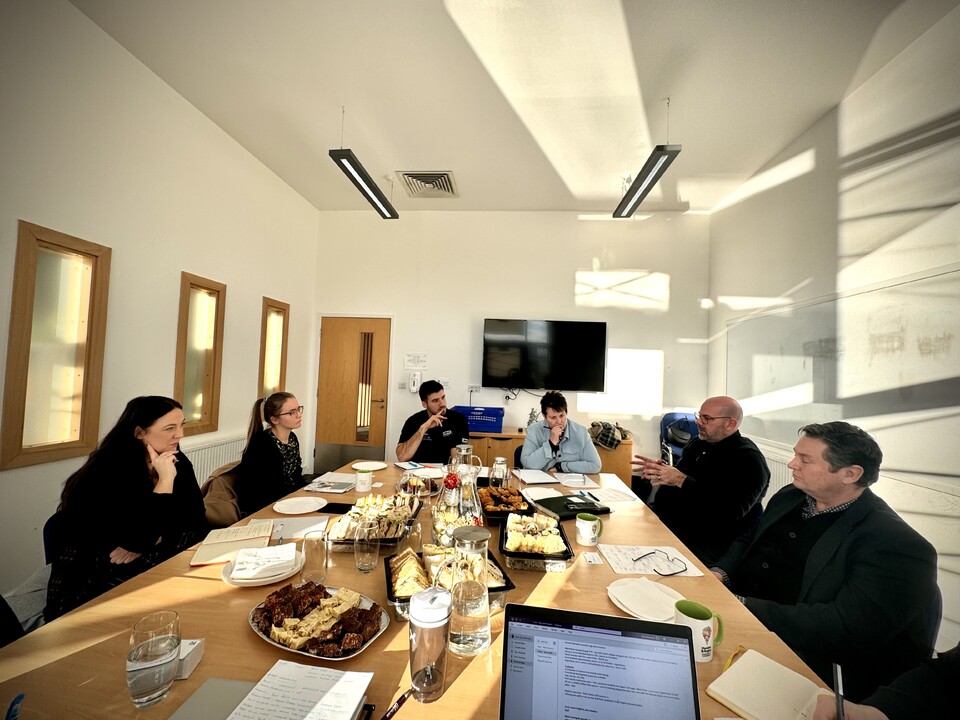Tay Cities SME Skills - Focus Group Findings
Written by Elaine Donnachie, Training Needs Advisor - Tay Cities in D&A College's Business Partnerships Team.

Elaine Donnachie.
A topic that has consistently made headlines in the business landscape over recent years: the ever-growing skills gap. This issue is particularly pronounced in Scotland, and within the Tayside region, businesses are grappling with the challenges posed by a workforce that doesn't always align with the demands of the modern economy.
According to the Employer Skills Survey undertaken between June 2022 and March 2023: "The results for 2022 show that 10% of establishments in both Scotland and the UK had a skill-shortage vacancy. This is up from 6% in 2017. In addition, there has been a sharp increase in skills shortage vacancies in both Scotland and the UK, with a rise of 106% between 2017 and 2022 in Scotland, and 135% in the UK. This meant that in 2022 31% of vacancies in Scotland were skills shortage vacancies, compared to 36% in the UK. Skill-shortage vacancies were more prevalent in certain sectors in Scotland, and lower in others."
The skills gap has become a pressing concern for employers across various industries. The disparity between the skills workers possess and those required by employers has far-reaching consequences, affecting productivity, efficiency, innovation, and overall growth. Tayside, with its vibrant economy, is no exception.
Focus Group Sessions

Engineering & Manufacturing - Focus Group Lunch Session.
On Tuesday 5th November, in conjunction with our local Chamber of Commerce, I hosted focus group sessions with local businesses, with the aim to look at what we, as a college, and as part of the business support ecosystem, can be doing better to assist with the above ongoing challenges.
Summary of the findings:
- 88% of businesses already currently outsource training for their staff development needs.
- 77% of businesses have had to increase training and support in "essential skills" and communication for the younger generation.
- 100% of businesses saw value in upskilling their staff and believed it was essential for retention and succession planning.
- 88% of businesses reported they would be interested in collaborating with their local college more, in particular if their courses could be tailored better to real life working environments
- 100% of businesses felt that the new Scottish wage increases were going to pose the biggest challenges for the upcoming year.
(The above findings are from a small number of businesses spoken to. If you wish to share your own experience, please don't hesitate to reach out.)
Attracting New Entrants
A pervasive problem arises in attracting new entrants to certain industries. The disinterest in what is often labelled as "dirty" jobs within construction / engineering / manufacturing is causing large shortages across the traditional trades. We as a college have already started to and continue to do a lot of work in educating the future workforce of the benefits of these roles, the progression possibilities, and wide range of project scope within this.
Refusal of Unsociable Hours
Despite the cost of living crisis leaving a large number of employees looking for wage rises to handle this in their personal lives: it is surprising to hear of the number of individuals in employment, or looking for employment, that refuse roles with "unsociable" hours (particularly prevalent in hospitality and tourism) or any shift work (most common in manufacturing, engineering and some trades) - Despite many of these roles coming with higher wage rates.
We can all recognise a huge shift in "life-work balance" post covid, and so it is essential that employers make these roles as attractive as possible for the individuals. One way to do this is looking at clear career progression and upskilling opportunities for these members of staff. This is especially clear for those who may not consider a job in hospitality as a career, unless otherwise educated and given the opportunity to make it one.
Lack of Particular Skills & Practical Experience
Many businesses express concern that graduates entering the workforce lack practical experience and essential skills relevant to their respective sectors, with the majority, if not all of their learning being done in a classroom. Bridging this gap requires a collaborative effort between educational institutions and businesses to ensure that academic programs are aligned with the evolving demands of the job market. This can only be done with the input and co-operation of local businesses that have the ability and capacity to work collaboratively with the establishments to ensure they are preparing your future workforce, for your business, and your needs.
Bridging the Gap Between Academia and Industry
As part of the Business Partnerships Team at the college, I'm delighted to highlight the already well established relationships between industry and curriculum. Dundee and Angus College takes pride in working in partnership with well over 1,000 companies and growing, ensuring that the learning experience at the college is the best possible fit for industry needs.
Furthermore, I'm delighted to report that almost all businesses attending on Tuesday currently invest in training for their workforce. And each and every business confirmed they definitely see the value in investing in upskilling opportunities to nurture their existing talent pool. The type of training currently utilised ranges from the standard, legislative courses through to bespoke built training looking at communication skills, leadership & management, and industry specific training. Growing in popularity includes Mental Health Awareness training and Sustainability / Net-Zero Planning courses.
Next Steps for us:
Therefore, it is clear that continuous learning and professional development are no longer optional but imperative for both employers and employees alike. I'm delighted to be part of the Business Partnership Team at Dundee and Angus College working on the Supporting SME Skills Project as part of Phase 1 of the Tay Cities Programmes.
This particular project looks to address the following:
- Lack of investment and uptake of employee training.
- Significant skills gaps and low utilisation of existing skills, underemployment.
- Productivity gap across region.
The objectives being:
- Combining resources of colleges, universities and business support agencies to enhance support for SME’s.
- Raise awareness and promote benefits of upskilling to SME’s.
- Support diversity, fair work and resilience within SME base.
While there are existing support providers, feedback from the partners - and as outlined in the Regional Skills Investment Plan (RSIP) and approved SOC - is that the support landscape is cluttered and fragmented with limited cross-organisation working and collaboration. As a result, the available support is small-scale and not aligned / joined up which has resulted in both duplication and gaps in the service offering.
Partnership Approach to Upskilling
One of the key challenges facing the SME businesses base in the Tay Cities Region is that there is underinvestment in training/ skills and developing the workforce. A large proportion of the business base are small and micro businesses and operate within ‘lower value’ sectors - 88% are micro businesses (73% have less than four employees) and 35% have an average annual turnover of less than £100,000. Due to constraints on staff time and resources, encouraging SMEs, and in particular micro businesses, to engage in training and skills offerings can be challenging. The RSIP identifies that: around 17% of employers reported skills gaps in their existing workforce (these can be due to a range of factors including recently recruited staff not yet up to speed); and 41% of employers reported cases of underutilisation of skills within their workforces.
With the support of the new Tay Cities SME Skills Fund coming to Tayside soon, I look forward to working alongside our partner providers: Fife College, UHI Perth, University of Dundee and Abertay University, as well as our professional partners: Skills Development Scotland, Scottish Enterprise, Business Gateway, Chamber of Commerce and FSB to address what we can of the above, and play our part in the solution. Through using a new joined up approach, we can ensure businesses are tapping into the most suitable support at the most relevant time.
Other findings:
It will come as no surprise to most, that the local businesses spanning various sectors, including hospitality and tourism, engineering and manufacturing, and construction and trades, are all voicing collective concerns regarding the recent announcement of wage increases in Scotland. With this being the first mentioned current challenge in each of the sessions hosted.
Wage Increases
The announced hikes in the National Minimum and Real Living Wages for April 2024 have triggered amplified challenges across these industries, feeling backed even further between a rock and a hard place, with their only options to manage these increases being to either increase sale prices - meaning unrealistic spending from customers in an already competitive market place. Increasing staff wages across the board to align (and keep differential rates) but having to reduce staff numbers to compensate. Or, absorb the increases, further reducing their already tight profit margins at a time when so many other overhead costs have also taken sharp inclines in recent years - which wouldn't be sustainable for the business.
Upskilling Opportunities
Now more than ever, it is imperative that businesses take the time to ensure their employees are working to their full potential, maximising output and working efficiently with their time, as well as looking at utilising technologies to support with this. The Business Partnerships Team at Dundee and Angus College would be more than happy to have a conversation around what training and upskilling opportunities may be available to ensure this within your workforce.
Integrating Younger Workforces
Another significant issue highlighted by businesses is the struggle to integrate a younger workforce, as many newcomers / school-leavers, appear unprepared for the rigors of real-world working environments, lacking crucial "life skills" essential for professional success. Many business owners employing the next generation of workforce are finding a large percentage of young people (16-24 year olds) now struggle with the basics of communicating with adults, answering phone calls, arriving to work on time and dealing with unexpected changes in their day.
With all business owners agreeing the covid years play a big part in this, they also believe education systems could be doing more to prepare their students for "real life" situations they will encounter in day to day life as well as work.
Dundee & Angus College Support

Business Partnerships Team at D&A College.
At Dundee and Angus College, we currently work with over 1,000 businesses and in the year 2022/23, through Flexible Workforce Development Fund, we invested £499,272 of training into the local economy, upskilling 1,674 individuals. On top of this, we also delivered 519 Modern Apprentices on our own contract with Skills Development Scotland. 68 Candidates for SNIPEF (plumbing), 152 candidates for SECTT (electrical) and 355 candidates for CITB (construction).
By connecting with Dundee & Angus College, we ensure we will do all we can to work towards getting your future workforce ready for the demands of your industry and your business.
For anyone that would like to hear more about the findings from our focus group sessions, please don’t hesitate to reach out.
Likewise, if you are a business in the Tay Cities region and think you can work with us on any of the above, we'd love to hear from you.
Find out more
Contact the D&A Business Partnerships Team
Call 01241 432 724 or
email business@dundeeandangus.ac.uk

